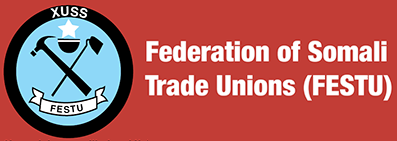The Federation of Somali Trade Unions (FESTU) joins the rest of the world in marking the importance of the World Day of Social Justice. This year’s theme, Closing the Inequalities Gap to Achieve Social Justice, speaks directly to Somalia’s current unacceptable levels of poverty. 51% of the Somali population lives below the international poverty line of US$1.90. This means 1 in 2 Somalis are poor, with many more vulnerable to falling into extreme poverty. Even those classified as “non-poor” are at risk should there be a sudden change in consumption levels.
Sustained conflicts, corruption and terrorism have also impacted Somalia’s macroeconomic outlook with poor levels of economic growth and high levels of unemployment and underemployment. The picture for the youth is even more disturbing: over 70% of Somalia’s population is under the age of 30 with the unemployment rate for those aged 14 to 29 sitting at 67%. Even within the sphere of employment, workers and workers organisations often contend with unsafe conditions, job insecurity, harassment, political interference and violations of their rights to associate.
“We call for meaningful civil and political action that will see Somalis being able to climb out of the poverty trap and define their future with dignity. Without this, social justice remains a fanciful hope. Somali government and political leaders must engage and act to achieve the aspirations of the Somali people for a shared, peaceful and secure future” said FESTU General Secretary Omar Faruk Osman.
Gender inequality also remains a major stain on Somalia’s social and political landscape. Somalia’s high levels of sexual violence, child marriage rates, harmful traditional practices and limited meaningful participation in politics by women, means women’s empowerment is not yet a lived experience.
These, and other issues, combine to prevent Somali people from enjoying social justice, and results in them continuing to experience discrimination and violations relating to class, tribe, religion, gender and disability.
On this World Day of Social Justice, FESTU not only calls for urgent and sustained action to promote the rights of Somalis for justice and decent life, but condemn the routine impunity that accompanies the violation of these rights. Ensuring that such perpetrators at all levels of society are made to account, must be a key pillar in a society that champions on human dignity.
Somalia has just about exhausted its appetite for war and conflict and a new social and political dispensation is on the horizon. However, peace, reconciliation and economic recovery is not possible without social justice.
